2020
In a year of pandemic and restrictions on in-person activities, the solar Campus was closed to visits, but scientific activities continued. It is worth highlighting the installation and comparison between different solar radiation sensors, exploring new approaches for characterization of the solar resource for photovoltaic systems integrated in buildings.
2019
Solar Campus Grows to C1 Rooftops

The Campus Solar's solar radiation measurement station, and the corresponding meteorological station, were moved to the top of the FCUL Building C1, to support the performance measurements of the PV plant installed there. With the sensors recalibrated, the equipment now constitutes the renovated solar radiation laboratory to support research and teaching. The new laboratory also includes testing prototypes of new radiation sensors.
Energy Summer School visits Solar Campus
Since 2015, FCUL annually hosts an Energy Summer School, aimed at secondary school students, to experience the university environment, while learning about renewable energy and sustainability, with faculty and students of the Integrated Masters in Energy and Environmental Engineering (MIEEA). During this week, participants can attend not only lectures, but also computational and laboratory classes, field work, where they will be able, for example, to measure solar radiation and carry out experiments with a model of a solar house.
2018
A solar powered campus
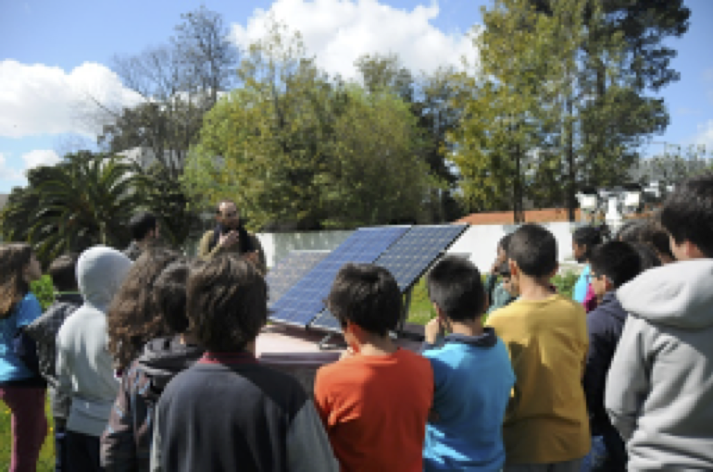
Almost a decade after the first steps, the Solar Campus is today a landmark in the Ciencias landscape, a unique place always open to experimentation, learning and communication, a window with a view towards a cleaner and renewable future. projects, ideas, lectures and the role of Campus Solar in science communication. https://www.spf.pt/magazines/GFIS/387/1070
Study of the effect of dust and dirt on the performance of solar systems
Campus Solar hosts two new experimental setups to measure the effect of dust and dirt on photovoltaic systems with various inclinations and orientations. This study is particularly relevant because there is little study of these effects in an urban environment.
2017
New laboratory for testing thermal insulation systems for low-cost self-built housing
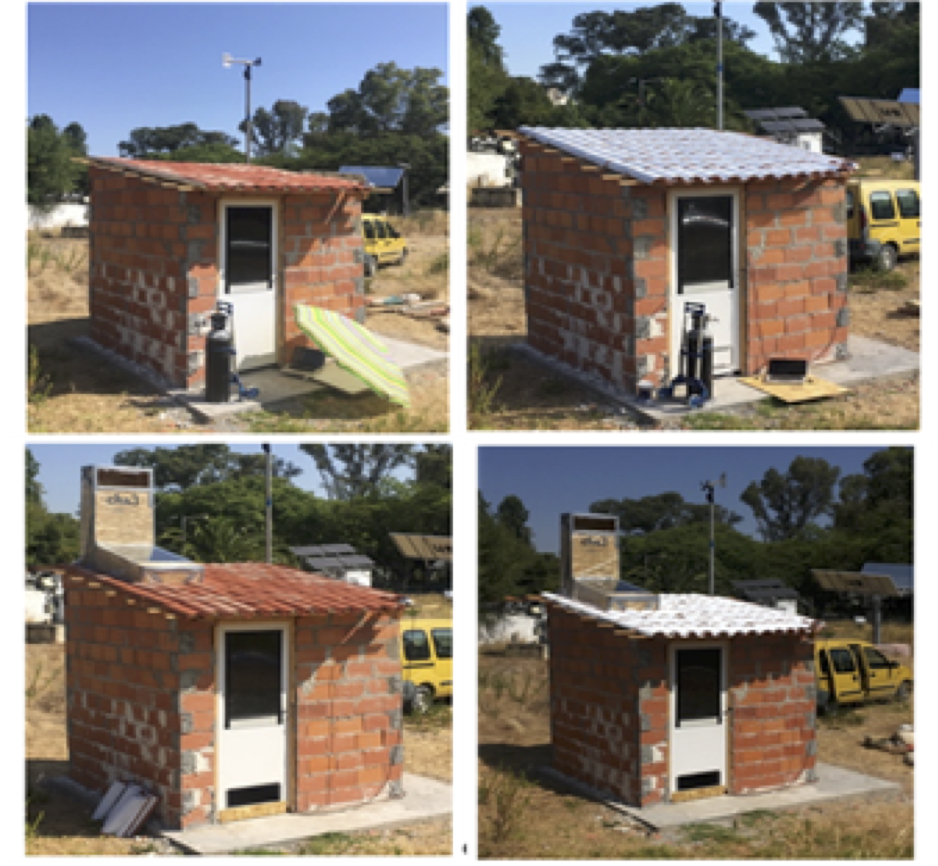
The laboratory for testing thermal insulation systems for low-cost self-built housing consists of an outdoor test chamber on Campus Solar. This chamber has simple masonry walls and can be configured with various covering solutions and interior thermal insulation. Currently this installation is being used to test insulation solutions based on recycled materials with great simplicity of installation.
2016
Visitors of all ages
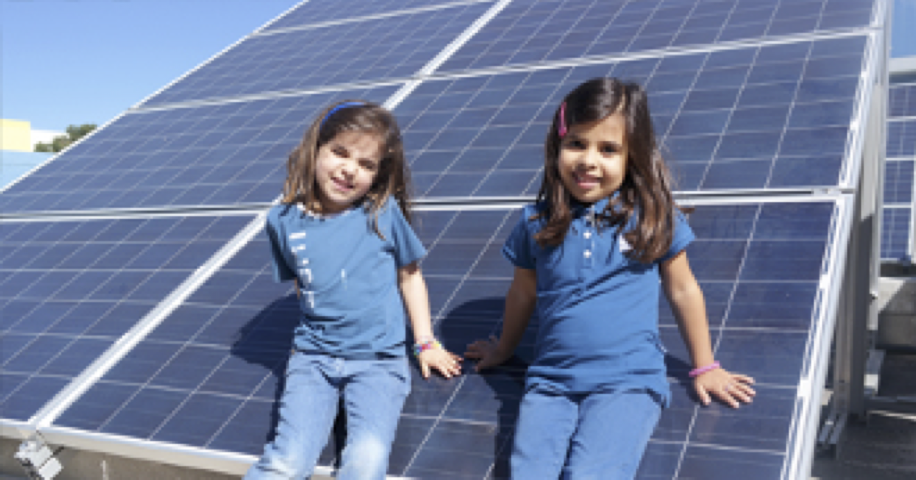
One of the missions of the Solar Campus is the dissemination of solar energy among younger people. There are many school visits and summer internships, open days and other similar initiatives. And from time to time, we have visits from younger children, who come to see live how solar energy can generate electricity, without noise and without smoke.
Master's thesis held at Campus Solar
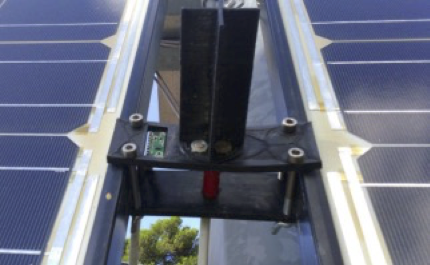
The Solar Campus offers privileged conditions for carrying out academic theses of an experimental nature on solar energy. For example, Dário Lopes developed and tested a solar tracking system using light sensors and an electronic prototyping platform (https://repositorio.ul.pt/handle/10451/24674)
Development of a new passive solar tracking concept

In partnership with Active Space and Martifer Solar, the SEGSOL project, financed by the Agência Nacional de Inovação, developed a new concept for passive solar tracking based on differential thermal expansion of vertical plates. The experimental prototype was installed and monitored at Campus Solar. One of the results was the master's thesis by Daniela Pereira (https://repositorio.ul.pt/handle/10451/20163).
2015
Master's thesis 'made' at the Solar Campus awarded
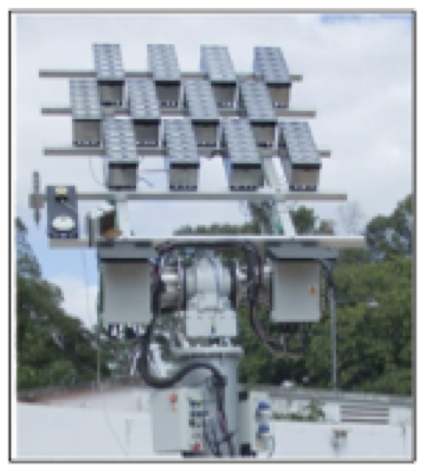
The APREN Award for Best Master's Thesis on Renewable Energy 2015 (honorable mention) was awarded to the thesis “Energy yield of CPV modules with different cell technologies” carried out by student Sara Freitas of the Integrated Master in Energy and Environmental Engineering. The dissertation (https://repositorio.ul.pt/handle/10451/9975) explores experimental measurements in the high solar concentration prototype of Circadian Solar installed on the Solar Campus, contributing to the development of new methods for characterizing the performance of this type of systems.
2014
1st Science in Motion Week | February 2014
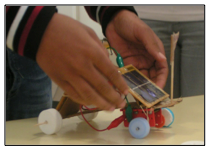
This week, the Faculty of Sciences at UL organized a set of activities structured in five thematic days, where different scientific areas "talked" among themselves and with visitors. Activities included scientific workshops, guided visits, peddy-papers, lectures and much more.
As the presence of Energy could not be missing, the Energy at Schools group carried out several of its activities, including workshops on solar scribbling and solar carts.
Radon monitoring station installed on campus | January 2014
Within the scope of RADON - Variability of radon gas in homes and soils - integrated experimental evaluation, an FCT research project on Geophysics and Meteorology, a station was installed to study the physical mechanisms that influence the variability of radon gas (radioactive gas) by combining experimental data and numerical modelling.
2013
One Planet, Our Home – Energy Day | November 2013
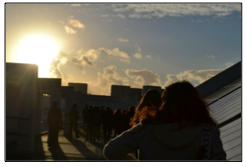
On this day, the theme of energy, common to many areas of research at the IDL, was celebrated with guided visits to the Exhibition of 160 Years of IDL and 150 Years of the Meteorological Observatory. The day's program also included workshops on solar carts and two lectures by professors from the energy department, one on a project in São Tomé and Príncipe called Escolas Solares, and another on the study and optimization of energy consumption in buildings.
Finally, everyone was able to enjoy the beauty of the late afternoon next to the photovoltaic roofs at the college and explore the prototypes on the solar campus.
Energy, Earth and Environment - Open Day DEGGE| May 2013
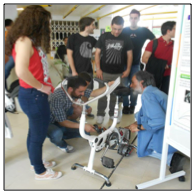
With the theme Energy, Earth and Environment, DEGGE's Open Day program included the presentation of final-year projects and exhibition of prototypes by undergraduates in Meteorology, Oceanography and Geophysics, Geographical Engineering and Integrated Masters in Energy Engineering and of the Environment.
Master's theses by Sara Sequeira, Maria João Chinita, Sofia Henriques and André Oliveira were also presented, as well as the GreenCampus Award given to the team of students André Malheiro et al who won this competition and Ricardo Leandro spoke about the European Innovation Award which he received for the creation of a hybrid solar system. Then, the exhibition of experimental prototypes and students' posters animated the rest of the afternoon.
European Sun Days – Solar Technologies Tour in Lisbon | May 2013
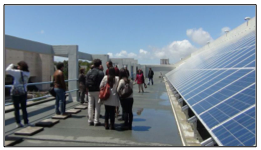
As part of the European Sun Days, a project co-financed by the Intelligent Energy Europe programme, Lisboa E-Nova, the Municipal Energy and Environment Agency and APISOLAR, the Portuguese Association of the Solar Industry, organized a visit to several buildings that adopt solar thermal and photovoltaic systems. The purpose of the visit was to give participants the opportunity to have direct contact with this equipment, verifying its practical use, both in public and private buildings.
The places visited were the Municipal Swimming Pool of Rego, the Jardins de São Bartolomeu condominium and the roofs of the Faculty of Sciences of the University of Lisbon.
Fourth Circadian Solar Award | April 2013
On the occasion of the commemorative session of the 102nd anniversary of FCUL, the fourth Circadian Solar Prize was awarded to the best student in the Solar Photovoltaic Energy subject of the Integrated Master's in Energy and Environmental Engineering, student Rodrigo Silva.
2012
Third Circadian Solar Award | April 2012
On the occasion of the commemorative session of the 101st anniversary of FCUL, the third Circadian Solar Prize was awarded to the best students in the Solar Photovoltaic Energy subject of the Integrated Master in Energy and Environmental Engineering, students Ana Oliveira and Sara Freitas.
2011
FCUL's solar campus connected to the grid | December 2011Campus Solar's photovoltaic systems are connected to the electricity distribution network under the Microgeneration Law: the electricity produced by solar systems is sold to the electricity network at a subsidized price. The proceeds will be used to support maintenance costs and support research projects in partnership with WS Energia. The connection to the grid was only possible with the offer of the thermal solar system from Bright Solar and the purchase of SMA Sunny Boy inverters, which have been accompanying the production of Microgeneration in our solar campus ever since.
Centenary of the University of Lisbon | April 2011
As part of the celebration of the centenary of the University of Lisbon, the initiative 100 PLACES – ROUTES AT THE UNIVERSITY consists of tours over the weekends from March to May 2011 to publicize the past and present of the University of Lisbon, as well as its connection to the city over the years. The tour included a visit to the Statue of José Pinto Peixoto, Solar Campus, C8 Building, C6 Building, D. Luiz Institute and Oceanography Institute and will be attended by: José Manuel Pinto Paixão (FCUL), Luís Mendes Victor (FCUL) , Ana Simões (FCUL), António Vallêra (FCUL), Miguel Centeno Brito (FCUL), Maria José Costa (FCUL), Architect Gonçalo Byrne, Architect José Laranjeira, Architect José Neves and Miguel Miranda (FCUL).
Second Circadian Solar Award | April 2011
On the occasion of the commemorative session of the Centenary of FCUL, the second Circadian Solar Prize was awarded to the best student in the Solar Photovoltaic Energy subject of the Integrated Master in Energy and Environmental Engineering, student Nuno Martins.
When I grow up I want to come to this School! |March 2011
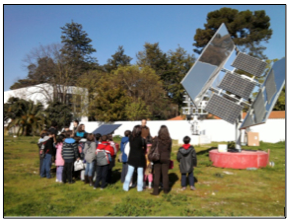
Visit of a 4th grade class from Escola Basica nº 35, from S. Sebastião da Pedreira, to learn about issues related to renewable energies, in particular about photovoltaic solar energy.
The visit, organized by the Energy and Environmental Engineering Students Commission and the doctoral student Ivo Costa, began at the Solar Campus, where the children could see the photovoltaic panels, discover how they are made, understand how they work and what are the differences between each technology.
They discussed the different forms of renewable energy they knew and were surprised that many of them were actually indirect uses of solar energy. The astonishment was equally huge when they realized that those panels with such a complex appearance were made from “beach sand”!
This was followed by a race of solar carts on the C6 and the children were able to better understand how electrical systems work in practice and what are the advantages and problems of photovoltaic technology. In an instant, everyone learned to exchange calls to put the car “in reverse”, tilt the cells towards the sun to receive more energy… and to shade the cars of the opponents. "After all, it's not that complicated!" And as they were all full of desire to be "scientists" when they grew up, the visit could not miss the Photovoltaic Applications Laboratory, where students could learn how to make photovoltaic cells from quartz crystals, ask all the questions about the experiments that are underway and understanding what that confusion of wires, machines, instruments is for.In the end, the students returned to school with notebooks full of notes, with the sharpest curiosity and a taste for science. As one of them said: “I'm going to tell my father that I want to go to this school”. We hope so!
Report on the RTP2 Science Program | February 2011
Science, Technology and Innovation Program, with reports and interviews with the protagonists of the sector, presented by Vasco Trigo.
2010
Solar tracker installed at the Faculty of Sciences | June 2010
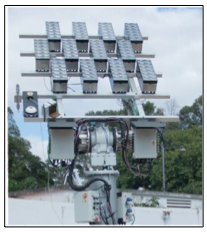
Circadian Solar, a leading developer of concentrated photovoltaic (CPV) systems, has installed a solar tracker on Campus Solar - Faculty of Science's Solar Systems Test Laboratory, taking advantage of the high direct solar radiation (DNI) in the city of Lisbon as well as the experience of the research group on solar energy at the University of Lisbon, led by Professor António Vallêra.
The installed system is a 5 m2 solar tracker, a subframe of the 30 m2 tracker (CS30). The solar tracker allows easier access to the frame for quick changes of modules under development providing high precision tracking of the CS30. Ethernet access allows remote follower control and transmission of monitoring data to Circadian UK headquarters for immediate analysis.
Prof. António Vallêra noted that the University of Lisbon is pleased to include Circadian Solar's solar tracker in its field of testing and that, “We are all eager to learn more from the data that the system is already collecting, pleased by this collaboration with Circadian Solar, helping them to develop innovative designs for market applications."
Dr. Geoffrey Duggan, Director of R&D at Circadian Solar commented: "Our solar research follower at the University of Lisbon is an important test unit that will greatly improve our development of III-V thin film solar cell modules, under development through our joint venture with the University of Radboud. Lisbon is easily accessible from the UK, and we are happy with this collaboration with Prof. António Vallêra and his team. When engineers arrived on site, the solar tracker was assembled, installed and connected, recording record-breaking performance that was instantly transmitted to our headquarters."
Circadian Solar First Prize | April 2010
On the occasion of the commemorative session of the 99th Anniversary of FCUL, the first Circadian Solar Prize was awarded to the best students in the Solar Photovoltaic Energy course of the Integrated Master's in Energy and Environmental Engineering, student Ana Bastos and student Lucas Fritz.
2009
National Photovoltaic Concentration Summit | November 2009
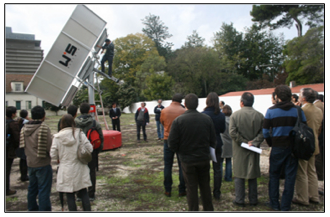
The first National Photovoltaic Concentration Summit was held on 26 November, a joint organization of the Faculty of Sciences of the University of Lisbon and the company WS Energia, the European leader in the installation of photovoltaic concentration systems. The Summit was also the occasion for the inauguration of the Solar Campus - Solar Systems Test Laboratory at FCUL.
The primary objective of the National Photovoltaic Concentration Summit was to bring together the different national R&D actors in the field of photovoltaic concentration to reflect on the challenges of its industrial development. With around a hundred participants, in addition to the hosts and the co-organizer, WS Energia, the Summit counted with the participation of the Instituto Superior Técnico, of the Faculty of Science and Technology of the Universidade Nova de Lisboa, the first national manufacturer of modules photovoltaic, Lobosolar, and leading national companies in the development and assembly of Globaltronic and HFA electronic components.
The Summit's scientific program was divided into two distinct parts. In the morning session, open to the public and with the participation of a significant number of Faculty students, the technological challenges and technical solutions to be developed in order to be able to manufacture photovoltaic generators capable of generating electricity at a cost competitive with the fossil fuels (10c€/kWh). The afternoon session, specific and restricted to researchers of the HSUN (High Sun WS Energia) medium concentration project, was dedicated to the analysis of technical aspects in advanced stages of development: design of high efficiency cells, selection of components to be integrated in the new ones. photovoltaic receivers, simulation of shadows and the overall efficiency of photovoltaic parks, design of intelligent electronics, among others. The partnership organization of this meeting resulted naturally from an ongoing project of direct collaboration between FCUL (through the Research Center for Sustainable Energy Systems, University of Lisbon - SESUL, and the Department of Geographical Engineering, Geophysics and Energy - DEGGE ) and the company WS Energia, based on participation in scientific projects and joint supervision of doctoral and master's students.
One of the fruits of this collaboration is precisely the Campus Solar – Solar Systems Test Laboratory at FCUL, whose official inauguration took place on the day of the summit. Campus Solar is an FCUL space for testing solar systems. The prototypes installed there, for now just a series of WS Energia photovoltaic systems, will soon be connected to the electricity grid for the sale of electricity under the Microgeneration Law. The proceeds from the sale of green electricity to the national electricity grid will initially be used to amortize the interventions that FCUL carried out in order to make it possible to use the space and connect to the grid. In the long term, the proceeds will be used for maintenance costs and investments in instruments and equipment, or other educational and scientific activities associated with photovoltaic systems.
The objectives of the Campus Solar project are of a scientific, pedagogical and scientific dissemination nature. From a scientific point of view, the monitoring of the systems now installed will make it possible to study the performance of low concentration photovoltaic systems with solar tracking. This performance will also be studied in the scope of the curricular work of the Integrated Master's in Energy and Environmental Engineering, in particular, in the subject of Solar Photovoltaic Energy, thus strengthening the practical training of our students who will have the opportunity to follow a real system inserted in an urban environment. . The choice of a space with great visibility to the outside reveals FCUL's strong commitment to the effort to promote renewable energies in general, and solar energy in particular, as well as the work with technological application developed at FCUL.
It was just a pity that the Sun did not collaborate in the opening of the Laboratory, showing itself only shyly through the cloud-laden sky...

